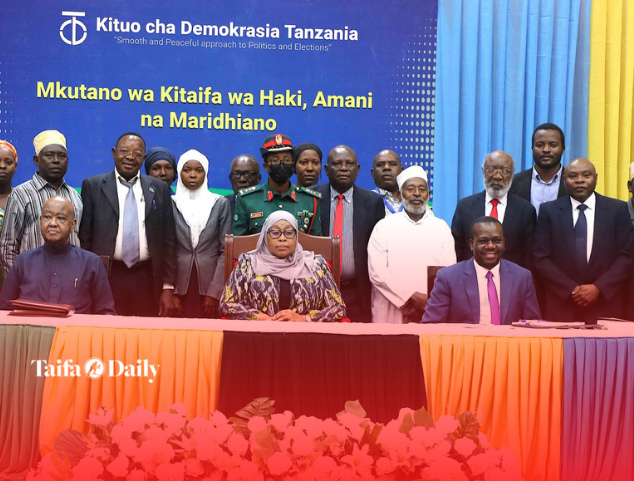On Tuesday, April 5, 2022, the Tanzania Center for Democracy finally managed to hold its conference in the capital of Dodoma after two consecutive failures due to logistical challenges.
The TCD Dodoma conference, with a theme of justice, peace and reconciliation, was attended by multiple pro-democracy stakeholders across factions such as political parties, diplomatic communities, faith organisations and other NGOs.
TCD aspires to create a congenial environment for political fairness amongst political parties and ensure a formidable democratic foundation to leverage the country toward socio-economic and political development.
TCD is keenly pushing for reforms of two laws, i.e. National Elections Act and Political Parties, that seem to be the bottleneck to free and fair elections in Tanzania. A prominent human rights NGO in Tanzania, Legal and Human Rights Centre (LHRC), gave a hand in the preparation of model bills that TCD ought to present to parliament. The success of the bills shall certainly witness Tanzania embarking on a full-fledged democratic country, according to Zitto Kabwe, the former TCD chairperson.
Despite being the member of TCD, the leading oppositional party, CHADEMA, defied the conference’s invitation citing credibility issues over the entire organisation accusing it of being the government’s covert program and stratagem designed to delay the new constitution. Apart from that, other reasons for their boycott are listed below.
Does CHADEMA have a point?
TCD’s political aspirations are not antagonistic to CHADEMA’s political ambitions, but rather CHADEMA is opting for a different approach toward reaching that mutual goal. The constant boycotting of TCD meetings by CHADEMA is because CHADEMA hardly believes in reconciliation while enduring unhealed wounds and multiple extrajudicial crimes inflicted upon them.
CHADEMA has clearly tabled its terms of intervention to TCD’s reconciliation meetings. One of them is that the government should publicly concede all the previous extrajudicial crimes it had committed upon the people, especially CHADEMA members’ who are the primary victims of those injustices. Mbowe heard in a video.
Mbowe admits conciliation to be a good thing, but for that to happen, conflicting parties need to understand the root causes of their conflict. The context of Mbowe’s remarks is that the constitution we have is the root cause of all the problems. Thus, without a new constitution that observes human rights and equally holds anyone responsible for their mischievous behaviours, then reconciliation is oblivion.
On this, I find CHADEMA to have presented a concrete point to back its decision to snub the TCD gatherings. But does the nature of Tanzania’s political atmosphere favourable to CHADEMA’s demands?
CHADEMA’s demands might be genuine in most cases, but unfortunately, their success is restrained by the nature of the political environment established by the weak constitution.
Since the wave of African democratisation started after the collapse of the Soviet Union in the early 1990s, a handful of countries in Africa have achieved full-fledged democracy, making them vulnerable to authoritarianism such as Tanzania in this case.
Tanzania being partially democratic makes CHADEMA’s demands likely becoming abortive. Its demands seem to have been presented at unfavourable timing, considering the fact that none could easily recall any government’s attempt to admit any of its wrongdoing.
I believe one wouldn’t want to remember the horribles Tanzania has gone through in the past six years. The experience should remind us that opportunities such as this presented by TCD are as uncertain due to the nature of our political environment. What if the late Magufuli was succeeded by a leader of his calibre?
Honestly, none could have imagined a chance as such for an open dialogue that brings multiple pro-democracy stakeholders under one roof could have happened in the past regime. CHADEMA’s defiance of TCD’s invitation might seem like throwing a golden chance in such uncertain country.
I believe CHADEMA’s political aspirations, one of them being getting the new constitution, can hardly take form overnight. There must be some progressive political developments that will set a foundation toward the bigger goal.
We cannot be sure when the day shall come that we will have a president like Samia, who at least gives a room for such events to take part. Thus, whenever a scant opening to discuss our matters pertaining to democracy is granted, it must be effectively utilised toward creating new endeavours.
Finally, at the TCD conference in Dodoma, almost every political party must have encountered the government’s aggressive hand. Thus, making CHADEMA not the only victim of the ruling government. The question to ask yourself is, why are they there?


